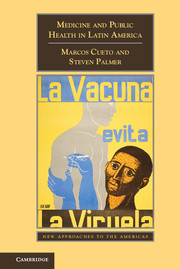Book contents
- Frontmatter
- Contents
- Acknowledgments
- Introduction
- Chapter One Indigenous Medicine, Official Health, Medical Pluralism
- Chapter Two National Medicines and Sanitarian States
- Chapter Three Making National and International Health
- Chapter Four Medical Innovation in the Twentieth Century
- Chapter Five Primary Health Care, Neoliberal Response, and Global Health in Latin America
- Conclusion
- Suggested Readings
- Index
- References
Conclusion
Published online by Cambridge University Press: 05 December 2014
- Frontmatter
- Contents
- Acknowledgments
- Introduction
- Chapter One Indigenous Medicine, Official Health, Medical Pluralism
- Chapter Two National Medicines and Sanitarian States
- Chapter Three Making National and International Health
- Chapter Four Medical Innovation in the Twentieth Century
- Chapter Five Primary Health Care, Neoliberal Response, and Global Health in Latin America
- Conclusion
- Suggested Readings
- Index
- References
Summary
Are there recurring patterns in the history of medicine and public health in Latin America? We think so. In the first place, the region has seen an ever-greater increase in the interchange among different medical systems derived from cultures that found themselves mixed, coexisting, or in relationships of exploitation. This is a process that can be traced to the sixteenth-century Conquest and then was enriched in the following decades with the arrival of workers and migrants from different cultures. In contrast to the apparent authority or civilizing ideal achieved by Western medicine at different moments in the history of Latin America, heterodoxy and dissonance have been the reigning factors in the medical ideas and practices of the majority of the population. Medical pluralism has not been the result of deficiencies in the medical system but a form of interacting among distinct ideas of life, the body, and illness.
The medical research accomplished in the late-nineteenth and twentieth centuries by such figures as Carlos Finlay in Cuba, Oswaldo Cruz and Carlos Chagas in Brazil, Carlos Monge in Peru, and Bernardo Houssay in Argentina underlines a second recurring pattern: the region’s medical and public health cultures, created through the circulation of ideas, people, and biological products, have been characterized by processes of local reworking, adaptation, and negotiation. These transcend any form of dependency conceived in terms of center and periphery, in which the latter has only a passive, submissive, or mimetic relationship with metropolitan medical cultures. The fruit of this creative interchange is that there is a growing participation of Latin Americans as individuals, as governments, and as nongovernmental organizations in international networks and discussions on the future of medicine, medical research, and health. Most recently, Latin American voices have been very present in such questions as the dimensions of bioethics, and in participation in public campaigns, such as those undertaken by the Global Fund to control HIV, malaria, and tuberculosis. This statement does not ignore the existence of asymmetrical, economic, and political relationships between Latin American and industrialized countries of the world and the cooptation of many highly trained Latin American individuals by U.S. institutions; but it tries to overcome the persistent traditional perspective that considers everything to be defined from abroad.
- Type
- Chapter
- Information
- Medicine and Public Health in Latin AmericaA History, pp. 259 - 268Publisher: Cambridge University PressPrint publication year: 2014

